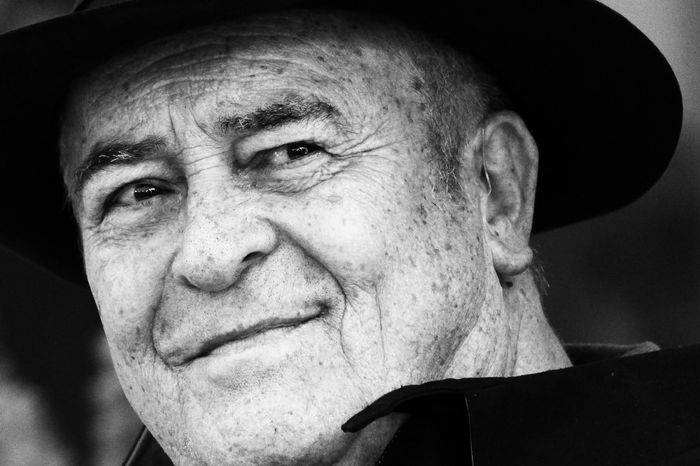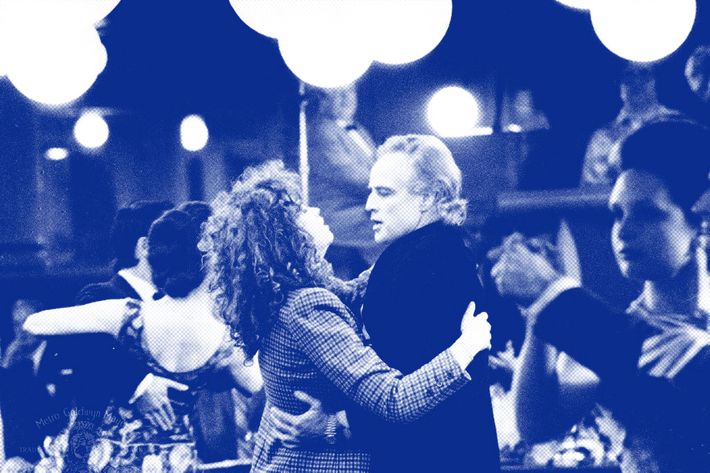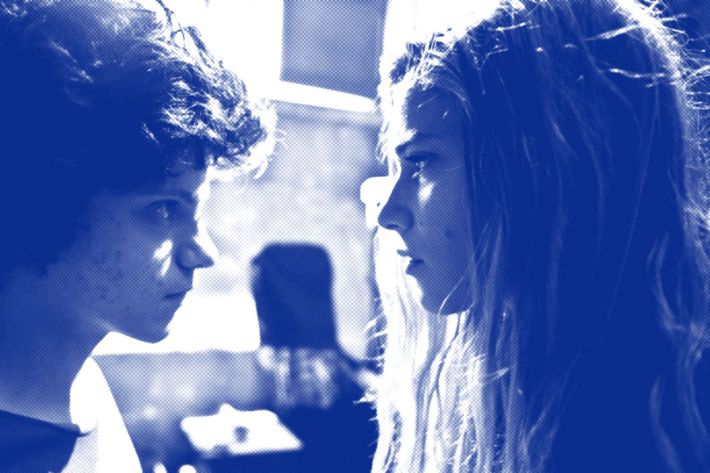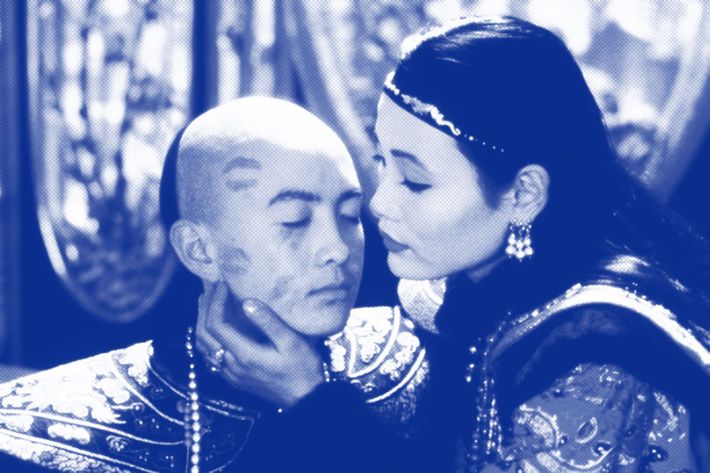
This story originally ran on July 19, 2014. It’s being republished on the occasion of Bertolucci’s death Monday morning from cancer.
“New York has always embraced me,” Bernardo Bertolucci reflects. The 73-year-old director is on the phone from Rome, talking about a visit he made to the city in December 2010 for a comprehensive Museum of Modern Art retrospective of his work. It was there that Bertolucci emerged from what seemed to be years of seclusion and depression and allowed the world to see him as he was – a man confined to a wheelchair, the result of several operations to deal with years of crippling back pain. “That was the first time I appeared in a wheelchair in public,” he says.
Of course, when Bertolucci talks of the city’s embrace, he’s also thinking of the momentous 1972 premiere of Last Tango in Paris at the New York Film Festival. “That date should become a landmark in movie history,” famously declared The New Yorker’s Pauline Kael at the time, comparing the event to the premiere of Stravinsky’s The Rites of Spring and calling Last Tango “the most powerfully erotic movie ever made.” It might still be the most influential movie review ever written, and it helped make Bertolucci one of the essential international auteurs of his time.

But if that earlier experience with the city partly defined his career, this more recent experience helped revive it. Not just because it allowed the director finally to make peace with his disability, but also because it was during his New York stay that he read his fellow Italian Niccolo Ammaniti’s novel Me and You, and decided that maybe cinema wasn’t over for him after all.
The novel, the story of a teenager who withdraws to the storage cellar in his apartment building, had a confined setting and stripped down dramatis personae. As a movie project, it seemed doable. “I thought, I can do this movie with two characters,” Berolucci says. The main characters are the boy, Lorenzo (played in the film by Jacopo Olmo Antinori), and his older, estranged half-sister Olivia (Tea Falco), who unwittingly intrudes on his basement idyll.
Of course, Bertolucci would make the story his own. “If I don’t fall in love with my characters, I cannot shoot,” he says. “I have to have this emotion, of idealized love. This is my way of making a story mine.” The biggest change he made to Ammaniti’s novel — and here comes a spoiler — was to let Olivia, an addict, live at the end of the film. “I can’t do that. Because it reminds me of all the movies I’ve seen where a junkie or something, at the end you know they will be dead — a kind of moralistic destiny. I decided Olivia had to walk away on her legs.”

The characters in the film are Bertoluccian in other ways, too. Lorenzo has a bit of an Oedipus complex, but this time, the dilemma is treated with humor. At one point, he interrogates his increasingly uncomfortable mother at the dinner table about what she would do if they were the only two humans left and had to re-populate the earth. It’s a funny scene, a marked contrast to the more tormented Oedipal yearnings of Luna, the director’s deeply disturbing 1979 film with Jill Clayburgh, which got banned in some places.
Bertolucci’s control over his frame is legendary, but so too is his openness to his actors: He practically let Marlon Brando walk off with Last Tango in Paris, letting the graying actor improvise for pages on end. “The person who acts a character gives life and flesh to what was written, and so much more comes with that,” Bertolucci says. “When I shoot, I try to feel the body and the face and the weight of the actor, because the character until that moment is only in the pages of the script. And very often, I pull from the life of my actors. I’m always curious about what these characters and these actors are hiding about their lives.” In Me and You, that manifested itself in Olivia’s former career as a photographer. (Like Bertolucci, who won a major prize for his poetry at age 19, Olivia also won an important literary prize as a teenager.) “When we shot the movie, Tea Falco showed me some of her photographs,” Bertolucci says. “She’s a real artist. She did all these ironical self-portraits. So it came from her own life, this piece of experience. In the script there is nothing about that. I often like to quote Jean Renoir, who said, ‘Always leave a door open on the set.’ Because reality has to come in through that door.”
In many ways, Me and You, for all its modesty and spareness, shows the director in a more playful and open mood than he has been in many years. Could it be the fact that it’s also his first Italian-language movie in three decades? “I was pleased to hear Italian in my movie again,” he says. “But if you don’t know Italian, you can’t feel and hear a Sicilian accent. In Italy, it’s so surprising and kind of funny to see and hear this very sophisticated girl, Olivia, with this strong Catanian accent.” He adds: “English dialogues are always just what you need and nothing more — like something out of Hemingway. In Italian and in French, dialogues are always theatrical, literary. You can do more with it.”
But there’s something else about Me and You that feels like it may be a renewal for Bertolucci. The ongoing interplay of individual vs. society in his films has, for the past two decades or so, led to narratives of seclusion, of physical isolation. The prevailing mood has been a kind of disappointment with the world — one that the director clearly shared, and one that stood in marked contrast to the idealism of his earlier films. But now, something seems to have changed.
To understand what, though, a bit of history may be in order: Like many Italian intellectuals, Bertolucci had a love affair with Marxism throughout the 1960s and ’70s. Indeed, part of the greatness of his work came from his self-aware treatment of ideology. As a child of the bourgeoisie, he presented characters struggling with the idea of revolution and class warfare. In 1964’s Before the Revolution, a young middle class man wrestles with his Marxist political beliefs. In the five-hour, activist historical epic 1900, a group of peasant revolutionaries, led by Gerard Depardieu, put their feckless landowner, played by Robert De Niro, on trial; it’s clear that Bertolucci identifies with De Niro, but aspires to be Depardieu.
By the time 1987’s The Last Emperor, a massive Oscar-winning historical drama about China’s final monarch, came around, Bertolucci had become disillusioned with the West, and particularly with Italy. “I was living in a country I didn’t like at the moment,” he now says of that period. “Politically, everything was dissolving, and corrupt. When I went for the first time to China, it was a kind of rebirth of my desire to shoot.” And The Last Emperor’s story could have been concocted out of Bertolucci’s own psychiatric sessions: The film’s protagonist was born in impossible luxury and ended his days as a poor, simple, happy citizen of the People’s Republic.

The psychological connections to his work didn’t stop there. Berolucci’s next film, The Sheltering Sky, about Americans traveling in post-WWII Tunisia, was a perfect encapsulation of souls adrift in a world that didn’t seem to want them. The film, starring John Malkovich and Debra Winger, was based on Paul Bowles’ classic novel of existential despair, but the weird sense of freedom and terror that looms over it clearly echoes Bertolucci’s state of mind at this time. “We were far away in the desert,” he recalls. “I remember sending a fax to my wife, saying how sad it was to shoot this husband and wife with a kind of glass wall between them: They can see each other but they can’t communicate with emotions. It’s the agony of the end of a love story. She replied, ‘While you were shooting that wall, the Berlin Wall fell!’ Because back then, when you were in a remote place with very few people around, you didn’t hear that kind of news. I remember Malkovich being very excited, thinking about what to wear now that the Wall had fallen. He placed a lot of importance on style.”
Thinking back to that period, Bertolucci reflects: “The end of communism changed the relationship I had with politics. Things became different, much less ideological. You can see that in my movies, which are all very much about myself in a certain era. In 1900, my relationship with politics was very different than when I was in China.”
The despair at the end of The Sheltering Sky found its own outlet in Little Buddha, another sumptuous epic set largely in Asia, this time intercutting the life story of Buddha (Keanu Reeves) with that of a young Seattle boy who is tapped as the reincarnation of a prominent lama. Though largely ridiculed by critics the film, again, presented a remarkable progression to those in tune with the psychological through-line of the director’s career. In the Buddhist ideals of self-negation and impermanence, Bertolucci had found a more spiritual outlet for his uneasy relationship with society and politics.
This sense of self-negation, of withdrawal, informs all his subsequent work. In Stealing Beauty, he presents a group of expatriates and intellectuals who have withdrawn into a villa in the hills of Tuscany, disillusioned with the world at large and with their broken ideals. In Besieged, a pianist (David Thewlis) withdraws into his Roman house, living a quiet, hermit-like existence. In The Dreamers, three young cinephiles and wannabe revolutionaries (two French siblings, played by Eva Green and Louis Garrel, and an American, played by Michael Pitt) closet themselves in a Paris apartment while the May 1968 riots rage outside. How much of this narrative withdrawal was due to the real-life physical problems confronting the director? “If you think of the pianist in Besieged, and the three kids of The Dreamers, the same things have been going on in a parallel way with me,” he says.
The withdrawal is, of course, always complicated by others: In Stealing Beauty, a young woman, played by Liv Tyler, comes to the Tuscan villa looking to find out which of these expatriates is her illegitimate father; in Besieged, the wife of an imprisoned African revolutionary (Thandie Newton), becomes the pianist-hermit’s maid; he falls for her and is forced to re-engage with the world; in The Dreamers, a rock thrown from the street literally punctures the three teens’ suicidal reverie. Even as Bertolucci’s characters have become more cloistered, the need for re-engagement has become more urgent, more personal.
And so, in Me and You, Olivia intrudes on the young Lorenzo. He’s a young man who has refused to confront the world; she’s a young woman who has engaged with the world and has the scars to show it. Olivia helps Lorenzo to discover the importance of connecting with another life; the boy, in turn, helps her gain back her self-respect and independence. The film is at once Bertolucci’s most confined and most hopeful film to date. The isolation of his characters in the earlier films very often had to do with a response to external events; they turned away in disgust, or horror, or disillusionment. Here, Lorenzo turns away simply because it’s in his nature. The first shot of the film shows the boy with his head bowed, talking to a psychiatrist — an older man in a wheelchair — as if Bertolucci might be symbolically speaking to his younger self. The director seems to agree. “I was quite shy in real life, when I was young,” he says. “So, I used my movies to show myself. I’ve said before that inside every shy person there is a bloody exhibitionist.”
To show how far Berolucci has come, it’s worth looking at the end of The Dreamers, in which the characters find themselves in the middle of a riot: One, rejecting violence, goes one way, while the others run towards the melee; the final image is of French riot police storming towards the screen. In Me and You, however, we see the two siblings on an empty street. As they embrace, the camera cranes up. “It’s like the end of a Hollywood movie,” says Bertolucci. Then, they separate, and as Lorenzo walks back home, the crane begins to come down, and we settle on a close-up of the young man. “In that frame, we see somebody who has grown up, and is in control. I thought of it as a kind of homage to the last shot of Truffaut’s The 400 Blows — the freeze frame of the very young Jean-Pierre Leaud.” But Truffaut’s freeze-frame, one of the defining images of the French New Wave, was an uneasy one — that of a boy who had found his freedom, but didn’t know what to do with it. Lorenzo, however, is clearly smiling. And that smile, one suspects, partly belongs to the director. It’s the look of a man happy to be back in the world.


